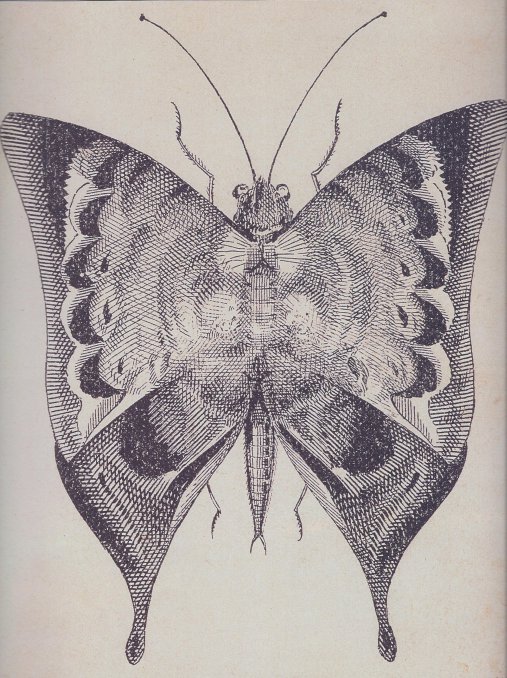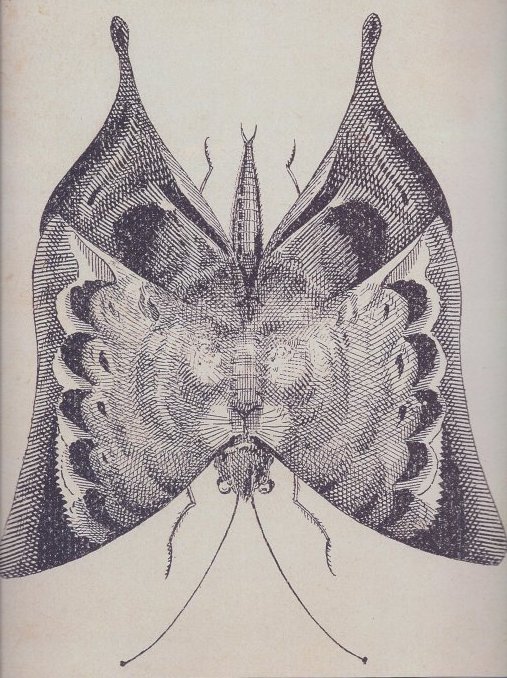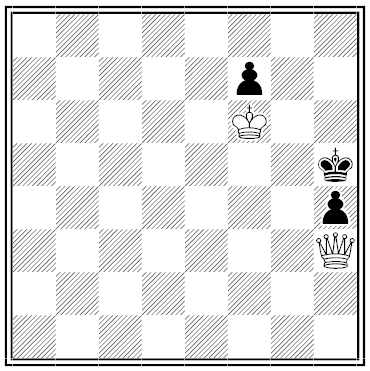“Whoever in discussion adduces authority uses not intellect but rather memory.” — Leonardo
Author: Greg Ross
Boxing Match

A large rectangle is partitioned into smaller rectangles, each of which has either integer height or integer width (or both). Prove that the large rectangle itself must have integer height or integer width.
A Few Lines
Letter from escaped slave Jackson Whitney to his former master, March 18, 1859:
Mr. Wm. Riley, Springfield, Ky. — Sir: I take this opportunity to dictate a few lines to you, supposing you might be curious to know my whereabouts. I am happy to inform you that I am in Canada, in good health, and that robbing a woman of her husband, and children of their father does not pay, at least in your case; and I thought, while lying in jail by your direction, that if you had no remorse of conscience that would make you feel for a poor, broken-hearted man, and his worse-than-murdered wife and child, and could not be made to feel for others as you would have them feel for you, and could not by any entreaty or permission be induced to do as you promised you would, which was to let me go with my family for $800 — but contended for $1,000, when you had promised to take the same you gave for me (which was $660.) at the time you bought me, and let me go with my dear wife and children! but instead would render me miserable, and lie to me, and to your neighbors (how if words mean anything, what I say is so.) and when you was at Louisville trying to sell me! then I thought it was time for me to make my feet feel for Canada, and let your conscience feel in your pocket. — Now you cannot say but that I did all that was honorable and right while I was with you, although I was a slave. I pretended all the time that I thought you, or some one else had a better right to me than I had to myself, which you know is rather hard thinking. — You know, too, that you proved a traitor to me in the time of need, and when in the most bitter distress that the human soul is capable of experiencing: and could you have carried out your purposes there would have been no relief. But I rejoice to say that an unseen, kind spirit appeared for the oppressed, and bade me take up my bed and walk — the result of which is that I am victorious and you are defeated.
I am comfortably situated in Canada, working for George Harris, one of the persons that act a part in ‘Uncle Tom’s Cabin.’ He was a slave a few years ago in Kentucky, and now owns a farm so level that there is not hills enough on it to hide a dog, yet so large that I got lost in it the other day. He says that I may be the means of helping poor fugitives and doing them as much good as he does, in time.
This country is not what it has been represented to me and others to be. In place of its being cold and barren, it has beautiful, comfortable climate, and fertile soil. It is much more desirable in those respects than any part of Kentucky that I ever saw. There is only one thing to prevent me being entirely happy here, and that is the want of my dear wife and children, and you to see us enjoying ourselves together here. I wish you could realize the contrast between Freedom and Slavery; but it is not likely that we shall ever meet again on this earth. But if you want to go to the next world and meet a God of love, mercy, and justice, in peace; who says, ‘Inasmuch as you did it to the least of them my little ones, you did it unto me’ — making the professions that you do, pretending to be a follower of Christ, and tormenting me and my little ones as you have done — had better repair the breaches you have made among us in this world, by sending my wife and children to me; thus preparing to meet your God in peace; for, if God don’t punish you for inflicting such distress on the poorest of His poor, then there is no use of having any God, or talking about one. But, in this letter, I have said enough to cause you to do all that is necessary for you to do, providing you are any part of the man you pretend to be. So I will close by saying that, if you see proper to reply to my letter, either condemning or justifying the course you have taken with me, I will again write you.
I hope you will consider candidly and see if the case does not justify every word I have said, and ten times as much. You must not consider that it is a slave talking to ‘massa’ now, but one as free as yourself.
I subscribe myself one of the abused of America, but one of the justified and honored of Canada.
Jackson Whitney
“Cherchez Le Tigre!”
Prior Investigations
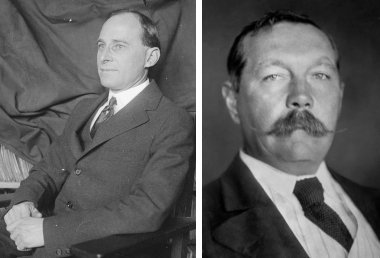
In 1915, critic Arthur Guiterman addressed a poem “To Sir Arthur Conan Doyle”:
Holmes is your hero of drama and serial;
All of us know where you dug the material
Whence he was moulded — ’tis almost a platitude;
Yet your detective, in shameless ingratitude —
Sherlock your sleuthhound with motives ulterior
Sneers at Poe’s “Dupin” as “very inferior!”
Labels Gaboriau’s clever “Lecoq”, indeed,
Merely “a bungler”, a creature to mock, indeed!
This, when your plots and your methods in story owe
More than a trifle to Poe and Gaboriau,
Sets all the Muses of Helicon sorrowing.
Borrow, Sir Knight, but be decent in borrowing!
Conan Doyle responded with “To an Undiscerning Critic”:
Sure there are times when one cries with acidity,
“Where are the limits of human stupidity?”
Here is a critic who says as a platitude
That I am guilty because “in ingratitude
Sherlock, the sleuth-hound, with motives ulterior,
Sneers at Poe’s Dupin as very ‘inferior’.”
Have you not learned, my esteemed commentator,
That the created is not the creator?
As the creator I’ve praised to satiety
Poe’s Monsieur Dupin, his skill and variety,
And have admitted that in my detective work
I owe to my model a deal of selective work.
But is it not on the verge of inanity
To put down to me my creation’s crude vanity?
He, the created, would scoff and would sneer,
Where I, the creator, would bow and revere.
So please grip this fact with your cerebral tentacle:
The doll and its maker are never identical.
House Cat
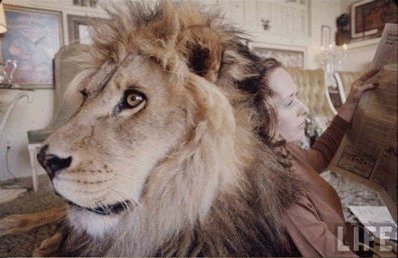
Tippi Hedren had a lion. The star of The Birds kept a full-grown African lion as a house pet in the 1970s.
“My mother and stepfather went to Africa in 1972 and found themselves stricken by the plight of animals there,” remembered Melanie Griffith, her daughter, in When I Was a Girl. “There was a prediction that by the year 2000 there would be no more wild animals. My stepfather made a movie about it, and my mother decided that we should get a real lion — that way, we could experience what living with wildlife was like.
“So we made friends with this guy Neil. He had a full-grown lion on his ranch, and we’d go out and visit him. Eventually we got a lion cub of our own. His name was Casey, and he was our first cat. Eventually we started to get more and more. The police would come to our door, and I’d take the lions, jump over the fence into this vacant lot, and hide there with the cats while the police searched the house. It was a wild thing to do.”

Hedren went on to found a California wild animal preserve that, among other things, is now home to Michael Jackson’s two Bengal tigers.
(Thanks, Dan.)
Pictures of England
Letters to the Times, April 1949:
Sir,
Your recent report that a rackets player ‘literally blasted his opponents out of the court’ suggests that gamesmanship is becoming less subtle. Is not the use of dynamite as out of place in a first-class match as, for instance, the word ‘literally’ in a metaphor?
Yours truly,
B.W.M. Young
Sir,
Perhaps the most picturesque use of ‘literally’ was that of a writer who asserted that ‘for five years Mr Gladstone was literally glued to the Treasury Bench.’
Yours faithfully,
E.W. Fordham
Sir,
My own favourite for the ‘Literal Stakes’ is the biographer who wrote of his subject that ‘he literally died in harness.’
Yours faithfully,
Gerald Barry
Sir,
Last summer a BBC commentator describing an easy victory in the ladies’ singles at Wimbledon, said: ‘Miss so-and-so literally wiped the court with her opponent.’
Yours faithfully,
Eileen Orde
Sir,
I submit the following, long and lovingly remembered from my ‘penny dreadful’ days: ‘Dick, hotly pursued by the scalp-hunter, turned in his saddle, fired, and literally decimated the Indian.’
Yours faithfully,
Edward Evans
Sir,
When I was assistant editor of the Saturday Review in the early 1920s, during a temporary absence of the editor I allowed a reviewer to declare in those august pages that his heart was literally in his boots.
Yours faithfully,
Ivy Davison
Sir,
A widely-read pre-war guide to Greece used to describe the inhabitants of that country as so interested in politics as to be visible daily ‘in cafés and restaurants literally devouring their newspapers.’
Yours faithfully,
F.J.B. Watson
Career Service
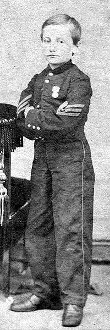
John Clem was only 10 years old when he ran away to win the Civil War. (“It was necessary that the Union should be preserved,” he later wrote, “and my help was obviously needed.”) Rejected by Michigan’s 22nd infantry regiment, he tagged along anyway as a drummer boy and rode into Chickamauga seated on a caisson and carrying a musket sawed off to match his size. When a Confederate colonel rode up and yelled “Surrender, you damned little Yankee!” Clem shot him, winning instant fame as “the drummer boy of Chickamauga.”
He went on to fight at Perrysville, Murfreesboro, Kennesaw Mountain, Peach Tree Creek, and Atlanta. After the war Ulysses Grant, now president, appointed him second lieutenant; when he retired as a brigadier general in 1915 he was the only Civil War veteran still on duty. “There is no more popular officer in the army,” wrote the New York Times. “Colonel Clem is the son-in-law of a Confederate veteran, and this fact he often cites in conversation with friends as proof of the fact that he is the most ‘united American’ extant.” He died in San Antonio in 1937.
Black and White
In a Word
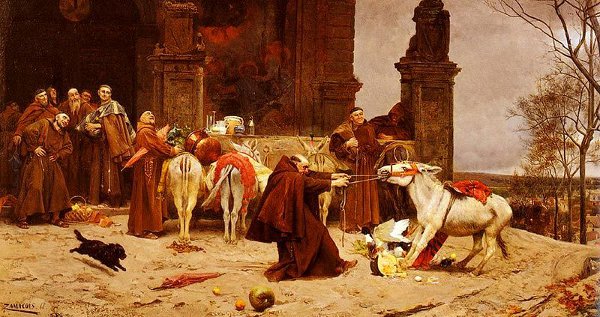
nolition
n. unwillingness
gelogenic
adj. producing laughter


